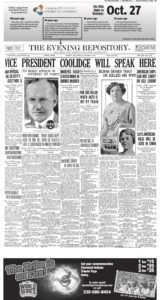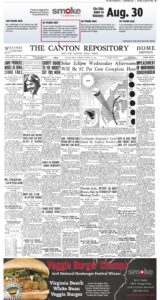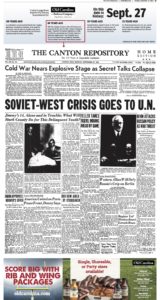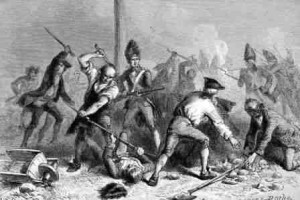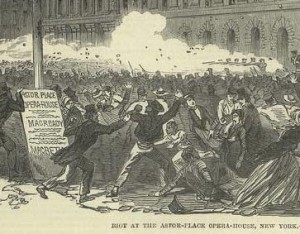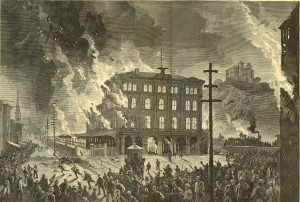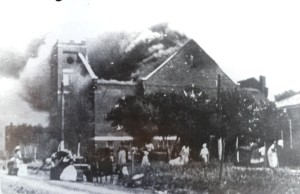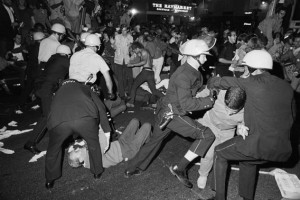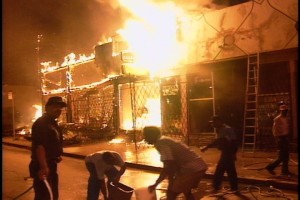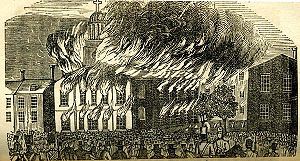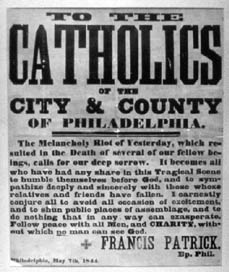In an early blog post, I confessed that I am a Big Chicken. I have this on good authority: I scored quite high in “harm avoidance” on the Minnesota Multiphasic Personality Inventory that I took in 1986. It’s tough to argue with science.
Because I generally do not get angry at people, I have occasionally been told I am kind and caring. That’s nice of these people, but there is an uglier truth; I’m a social coward. I often try to avoid making people mad or upset with me. Growing up, I avoided getting in trouble so that people would not think badly of me. It often has been not so much about compassion and doing what is right as it is about the protection and preservation of my own standing in with others.
Oddly, my desire to please others can get me into trouble. I found this out in the 5th grade church camp at Camp Lakewood.
For some reason, the boys in our tent were left unattended for a time one afternoon. To minds, this meant that we had to do some “boy” things. My friend Steve and another guy whose name I can’t remember (we’ll call him “Todd”) thought it would be a great idea if we raided a girls’ tent.
I didn’t know what “raiding” meant, but I went along because, you know, I didn’t want to make Steve and Todd upset with me. We snuck over to the empty girls’ tent (who knows where they were?) and slipped inside. It was then that I learned that “raiding” meant dumping over their suitcases, throwing their clothes around, and tipping over their cots. I realized I was supposed to join Steve and Todd in these activities.
It was an awful moment for a Big Chicken.
On the one hand, Steve and Todd would be annoyed with me if I did not join in. On the other hand, the girls would be upset with me if I joined in. And then there were The Camp Authorities. They would be really upset with me if I joined in.
What was I to do? I went into classic bystander mode: I stood to the side, shuffling my feet.
Afterward, Steve commented that I didn’t do anything in the raid. “I did, too,” I lied, not very convincingly.
That night at dinner in the camp dining hall, one of the camp counselors stood and announced that someone had raided a girls’ tent that afternoon. He asked that those who did it should stand up.
That was a very awful moment for a Big Chicken.
I thought that we would be in the clear if we just laid low. The moment would pass and nobody would find out. But lo, and behold, Steve stood up. (What was he thinking?!?) Then Todd stood up! And now I was in deep trouble. I quickly realized that if I didn’t stand up, Steve and Todd would be mad at me, and then they would tell the counselors, who would be mad at me, who would tell the girls, who would be mad at me. I stood up.
Church camp is a great place for the confession of sins. Particularly confessions that are provoked by peer pressure.
Our punishment was to clean out one of the bathrooms. The girls did not say anything more about the raid that week. They might have felt justice had been properly meted out. Or they might have still been mad at us but knew it wouldn’t do any good to say anything. (By the 5th grade, girls have had a lot of practice at being annoyed with boys). Meanwhile, the counselors said a few nice things about our willingness to be honest and come forward. The work in the bathroom seemed to be helping out the camp somehow. I felt a bit noble. Not deservedly so, but I felt noble anyway.
And that, oddly, brings us to what is really and truly an awful era in world history. I am intrigued by the courage of “rescuers” in World War II, perhaps because of my memories of peer pressure and my desires to avoid trouble. When we think of courage in history, we often think of soldiers, for courage is obviously a key component of military activity. But I also find courage among civilians interesting because it emerges in ordinary life when it would be so easy to stand to the side and shuffle one’s feet. Soldiers usually do not have the choice to be bystanders; civilians usually do. In fact, millions of Europeans chose to be bystanders while the Nazis rounded up Jews and other opponents or undesirables and sent them off to concentration camps.
But there were also rescuers. We are most familiar, probably, with Oskar Schindler. Many Christians know about Corrie Ten Boom. There were thousands more. I find each individual story fascinating.

Lucas Carrer
Two of my favorite rescuers are Metropolitan Chrysostomas and Lucas Carrer. In 1943, when the Germans occupied Greece, a contingent of Nazi officers landed on the island of Zakynthos. The German commander called in Carrer, the mayor, and asked him to hand over a list of the names of all Jews living on the island.
What to do? What would you do?
Carrer went to Metropolitan Chrysostomas, the local bishop of the Greek Orthodox church. After some discussion, the two met with the Nazi commander, gave him a piece of paper, and told him that this was the list of Jews on the island.
It had two names on it: Bishop Chrysostomas and Lucas Carrer.
That is courage.
The Nazis did not send the two to concentration camps (a real possibility) and the Nazis did not manage to locate the Jews of the island, either. Bishop Chrysostomas and Lucas Carrer had burned the lists of the 275 Jews on the island. They also got word out to the Jews to flee into the hills. After occupying Greece for a year, the Nazis were forced to pull out. For the mayor, the bishop, and the Jews on the island, the story has a happy ending. Millions of others, of course, were not so fortunate.
Why are some rescuers and others bystanders? I would like to think that if I were under Nazi occupation, I would have been a rescuer. However, I know what it is like to want to preserve myself and avoid conflict. I understand how the bystanders thought. Would I really have been a rescuer? It is disturbing to realize I cannot answer with certainty.
Why, then, did some people become rescuers? It might be that there is an inclination toward courage that is hard-wired into some of us (OK, some of you). But even if that is true, there is more to it than that.
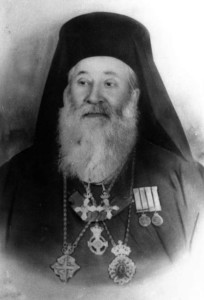
Metropolitan Chrysostomas
Christians, I think, would probably argue that there is a spiritual dimension to courage. I agree. Through their own accounts, we can see the personal dimensions of faith and the Holy Spirit at work in the lives of Nazi resistors like Corrie Ten Boom, Dietrich Bonhoeffer and Martin Niemoeller. If I had more information, I would guess we would find the same sort of personal spiritual evidence from Bishop Chysostomas and probably Lucas Carrer.
But the fact remains that there were plenty of Christians who were bystanders, as well. I think, then, that it would be helpful to consider how social and cultural patterns shaped rescuers as well.
This, then, is a point I find interesting: when asked why they risked their lives to help others, most rescuers found the question puzzling. Most say that they were just doing what was right. They didn’t agonize over the decision at the time.
This would seem to indicate that there is something to the patterns of their lives before the big moment of decision arrived. There is evidence that these were people who were in the habit of doing what was right in the small things before the Big Thing came along. Over time, they had developed a strong sense that their own comfort, status and safety was less important than the welfare of others.
Those patterns have spiritual dimensions to them. Ultimately, true courage is about loving others more than our own lives. That is something that does not simply happen because of a one-time commitment. Or, in theological terms, it seems to be more about sanctification than justification.
That is one reason why spiritual practices matter. Disciplines like regular worship, prayer, fellowship, and Bible study matter. And so does church camp.

